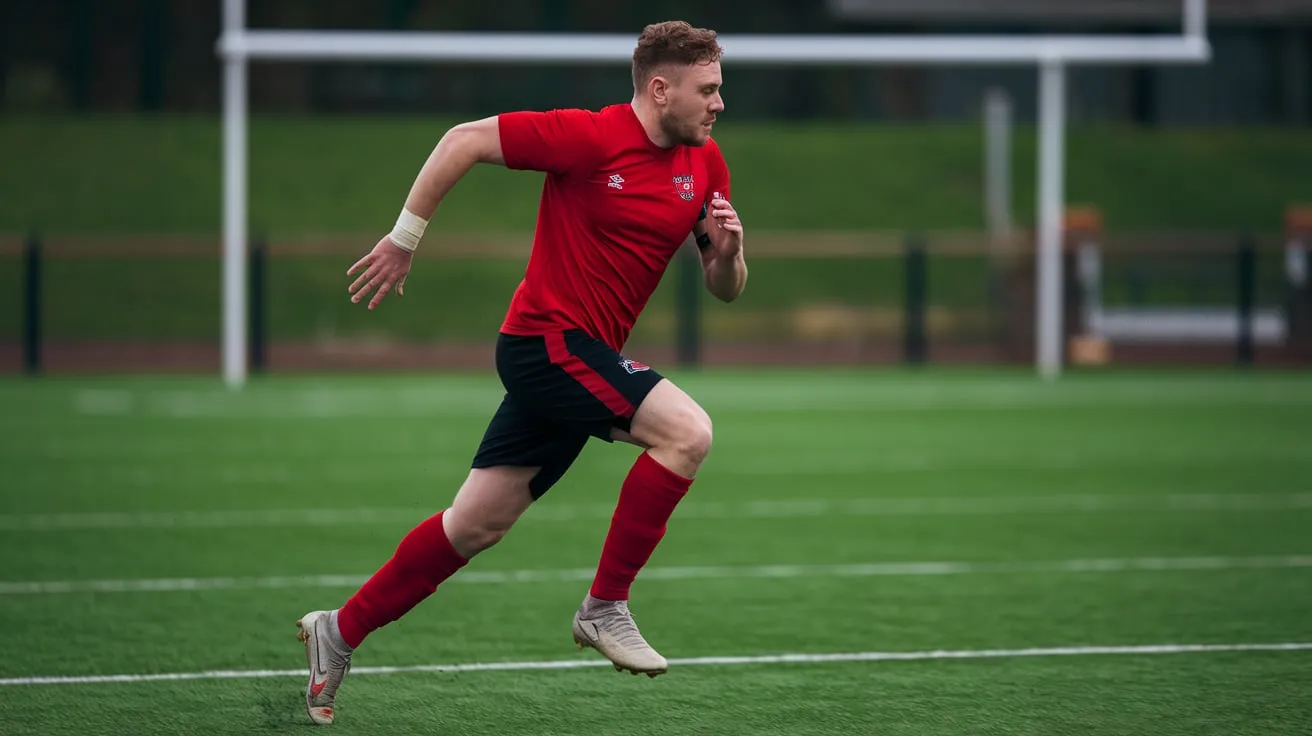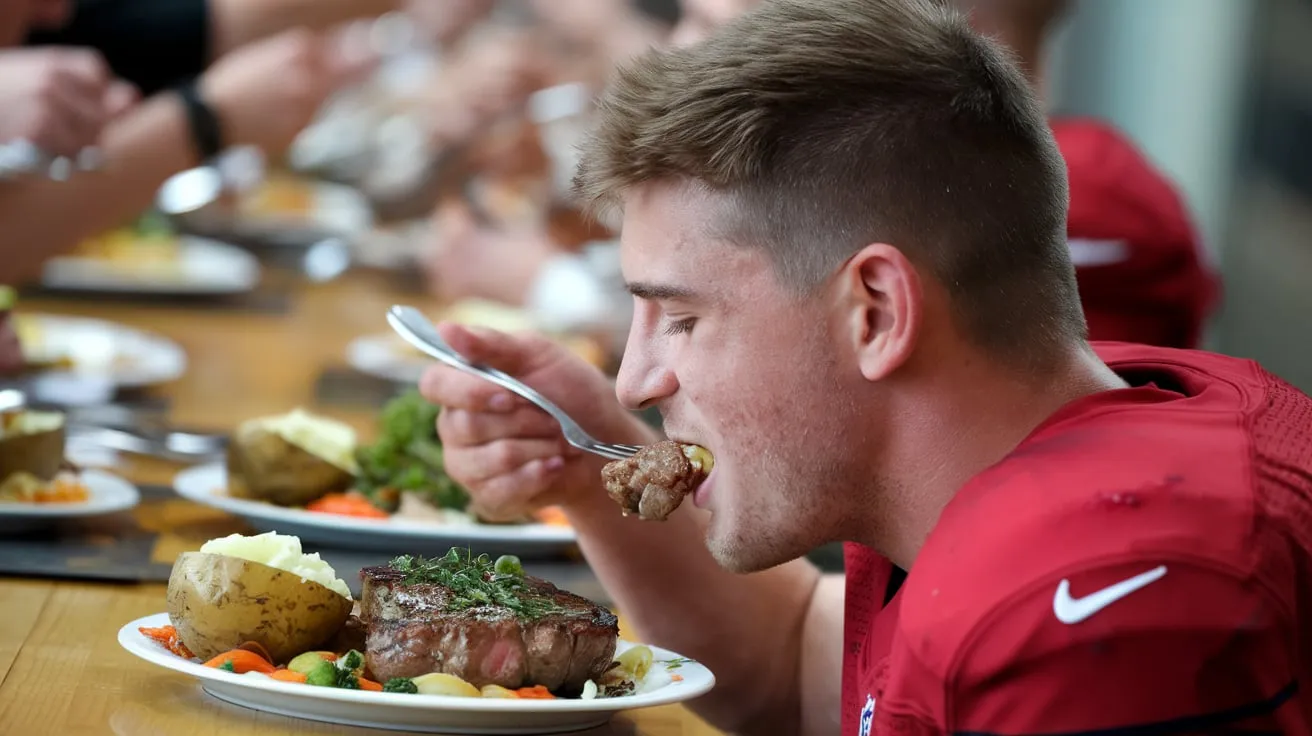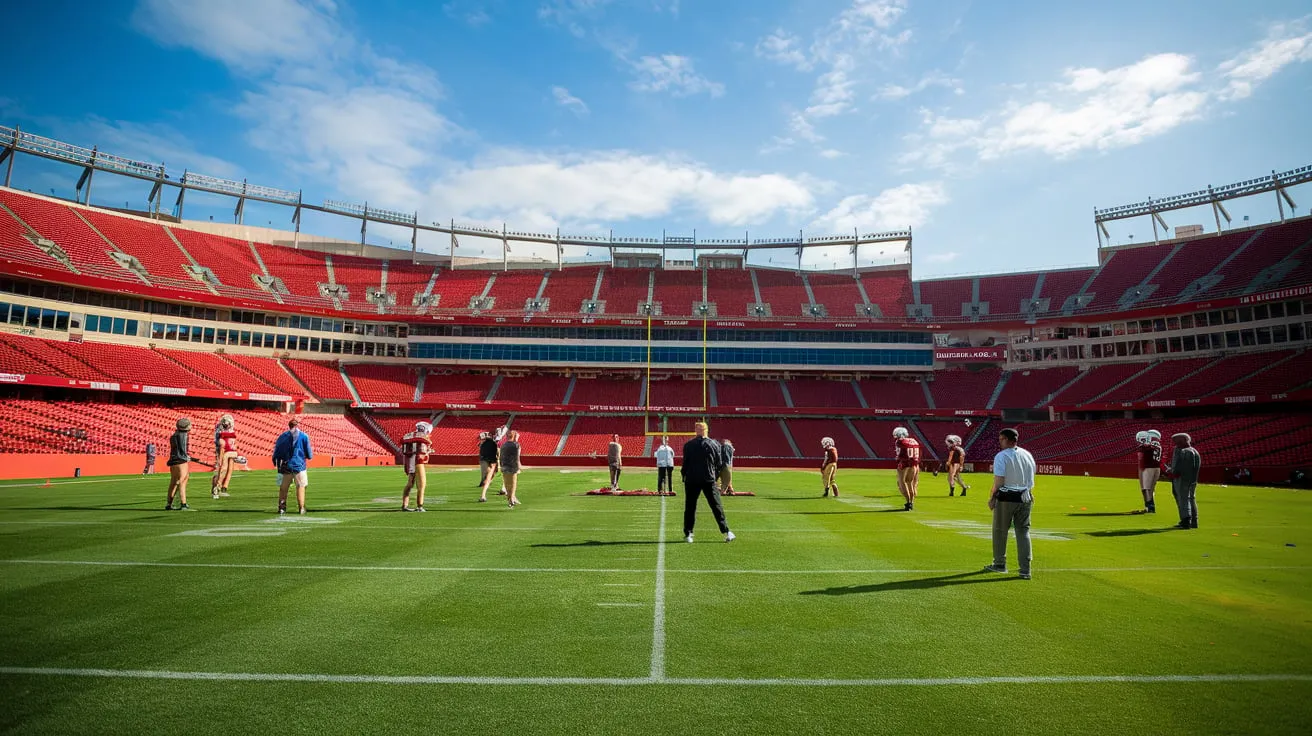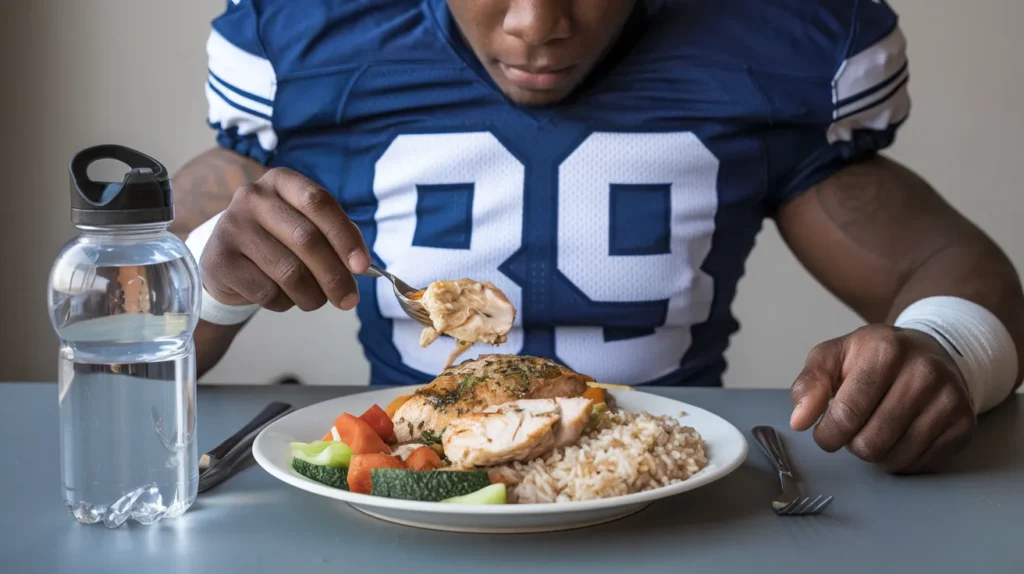Introduction
Football is a physically demanding sport that requires players to perform at their highest level, whether it’s sprinting down the field, making precise passes, or enduring intense physical contact. Football nutrition tips achieving peak performance on the field requires more than just skill and technique—it demands the proper fueling of the body. Nutrition plays a critical role in an athlete’s ability to perform, recover, and prevent injury.
In this comprehensive guide to football nutrition, we’ll explore what athletes should eat to maximize their performance. By focusing on balanced macronutrients, hydration, micronutrient-rich foods, and specific meal timing strategies, you can optimize your energy levels and improve endurance, strength, and overall performance.

Why Nutrition Matters in Football
To perform at the highest level, football players must prioritize their nutrition. A study by the American College of Sports Medicine highlights that an athlete’s diet can account for as much as 25% of their overall performance, with proper nutrition influencing everything from energy levels to recovery time.
With football players constantly engaging in high-intensity activities, their bodies rely on a wide array of nutrients. Football nutrition tips Proper nutrition ensures the body has enough energy to maintain performance during extended periods of activity, while also aiding recovery after each game or training session.
Key Benefits of Proper Nutrition for Football Players:
- Increased Energy and Endurance: Consistent energy levels are vital for players to perform at their best throughout the match.
- Faster Recovery: Proper nutrition helps muscles repair quickly after intense physical exertion.
- Injury Prevention: Nutrients such as vitamins and minerals are essential for maintaining bone and joint health, helping to reduce injury risks.
Macronutrients: The Foundation of Football Nutrition
Macronutrients—carbohydrates, proteins, and fats—are the building blocks of every diet. Football nutrition tips For football players, the right balance of these macronutrients helps fuel high-intensity efforts, supports muscle recovery, and enhances overall health. Let’s break down the role of each macronutrient.
Carbohydrates: The Primary Source of Energy
Carbohydrates are the body’s preferred energy source, especially during intense physical activity like football. Football nutrition tips When consumed, carbs are broken down into glucose, which is then stored as glycogen in the muscles and liver. These glycogen stores are what athletes rely on for quick energy during exercise.
How Much Carbohydrate Do Football Players Need?
Football players require about 6-10 grams of carbohydrate per kilogram of body weight per day, depending on their training intensity and the duration of exercise. For example, a 75 kg (165 lbs) football player may need anywhere from 450 to 750 grams of carbs per day.
Top Sources of Carbohydrates:
- Whole grains (brown rice, quinoa, oats)
- Vegetables (sweet potatoes, corn, peas)
- Fruits (bananas, apples, berries)
- Legumes (lentils, chickpeas, beans)
Protein: Building and Repairing Muscles
Protein is essential for muscle recovery and repair, especially after intense training or matches. Football players engage in explosive movements that strain muscles, making protein intake crucial to rebuild damaged tissues and promote muscle growth.
How Much Protein Is Needed for Football Players?
Football players should aim for about 1.2 to 2.0 grams of protein per kilogram of body weight. For a 75 kg player, this translates to 90-150 grams of protein per day, which can vary based on their training goals (e.g., strength training or endurance focus).
Top Sources of Protein:
- Lean meats (chicken, turkey, lean beef)
- Fish (salmon, tuna)
- Eggs and egg whites
- Plant-based proteins (tofu, tempeh, edamame, lentils)
Fats: Essential for Long-Term Energy
Although carbohydrates are the primary fuel source during high-intensity exercise, fats play an important role in sustaining longer-duration activities and promoting overall health. Fats provide a stable energy source and support the absorption of vitamins A, D, E, and K.
How Much Fat Do Football Players Need?
Fats should make up around 20-35% of a football player’s total daily calorie intake. For a 2,500-calorie diet, this would be about 55-97 grams of fat per day.
Top Sources of Healthy Fats:
- Avocados
- Nuts and seeds (almonds, chia seeds, flaxseeds)
- Olive oil and coconut oil
- Fatty fish (salmon, mackerel)
Hydration: The Key to Performance

Proper hydration is often underestimated but is essential for peak performance, especially in a sport as physically demanding as football. Dehydration can impair muscle function, reduce endurance, and lead to quicker fatigue.
How Much Water Do Football Players Need?
During exercise, football players can lose anywhere from 0.5 to 2 liters of sweat per hour, depending on factors like intensity and climate. As a result, players should aim to drink at least 3-5 liters of water per day, with additional hydration before, during, and after training or matches.
Hydration Tips for Football Players:
- Drink water consistently throughout the day.
- Replenish electrolytes lost during intense training or games with sports drinks or electrolyte tablets.
- Consider consuming a combination of water and coconut water to restore potassium and sodium levels.
Micronutrients: Supporting Overall Health
While macronutrients take center stage, micronutrients—vitamins and minerals—are just as crucial for football players. These small but mighty nutrients support everything from immune function to bone health.
Important Micronutrients for Football Players:
- Vitamin D: Important for bone health and muscle function. Sources include sunlight exposure and foods like fatty fish and fortified dairy.
- Iron: Critical for oxygen transport in the blood. Red meat, chicken, and leafy greens like spinach are rich sources.
- Calcium: Essential for bone strength and muscle function. Dairy products, fortified plant milks, and leafy green vegetables are excellent sources.
- Magnesium: Supports muscle relaxation and recovery. Nuts, seeds, and whole grains are rich in magnesium.
Vitamins for Immune Health:
Football players often train and compete in high-stress environments, which can take a toll on the immune system. Vitamins C and E act as antioxidants, helping to protect cells from oxidative stress and supporting overall immune function.
Meal Timing for Optimal Performance
What you eat is important, but when you eat can make a significant difference to your performance. Proper meal timing ensures that the body has sufficient energy during training and recovery periods.
Pre-Game Meal (2-3 Hours Before Kickoff)

A balanced pre-game meal that is rich in carbohydrates and moderate in protein is ideal for sustaining energy throughout the match. Aim for a combination of easily digestible carbs and lean protein, such as:
- Chicken and rice with vegetables
- Whole-grain pasta with marinara sauce and lean meat
- A sandwich with whole-grain bread, turkey, and avocado
During the Game (Hydration and Energy)
If the match lasts longer than 90 minutes, it’s important to stay hydrated and refuel with electrolytes and carbohydrates. Sports drinks or energy gels are commonly used during the game to maintain energy levels.
Post-Game Recovery (30-60 Minutes After)
The post-game meal should focus on replenishing glycogen stores and promoting muscle repair. Aim for a meal with carbohydrates and protein in a 3:1 ratio. Example:
- A protein shake with banana and a scoop of peanut butter
- Grilled chicken with sweet potatoes and spinach
Supplementation for Football Players
While a well-rounded diet should provide all essential nutrients, some players may opt for supplements to enhance performance and recovery.
Common Supplements for Football Players:

- Protein Powders: Help meet protein requirements, especially for players on the go.
- Creatine: A supplement that supports high-intensity efforts and muscle strength.
- Branched-Chain Amino Acids (BCAAs): May help reduce muscle soreness and improve recovery.
- Fish Oil: Supports joint health and reduces inflammation.
Should Football Players Use Supplements?
Supplements can be effective, but they should never replace whole foods. Always consult with a healthcare provider or sports nutritionist before starting any supplementation regimen.
People Also Ask
What should football players eat before a game?
Football players should eat a balanced meal rich in carbohydrates and moderate in protein 2-3 hours before the game. Examples include chicken and rice, whole-grain pasta with lean meat, or a turkey sandwich with avocado. This provides a steady release of energy throughout the match.
What is the best post-game meal for recovery?
A good post-game meal should consist of a 3:1 ratio of carbohydrates to protein. Foods like grilled chicken with sweet potatoes, or a protein shake with a banana, help replenish glycogen stores and repair muscle tissues.
How much protein should a football player eat?
Football players should consume between 1.2 to 2.0 grams of protein per kilogram of body weight daily. For a 75 kg player, this translates to 90-150 grams of protein per day. This helps with muscle recovery and repair.
Is hydration important for football players?
Yes, hydration is critical for football players. Dehydration can lead to muscle cramps, fatigue, and decreased performance. Players should aim to drink at least 3-5 liters of water per day, and hydrate regularly during training and matches to prevent dehydration.
Conclusion: Fuel Your Game for Peak Performance
Proper nutrition is not just about eating more—it’s about eating smarter. A balanced intake of carbohydrates, proteins, fats, and micronutrients, paired with strategic hydration and meal timing, can significantly enhance a football player’s performance and recovery. By fueling the body with the right nutrients at the right time, athletes can perform at their best, prevent injuries, and recover faster.
Whether you’re an amateur player or a professional, understanding how to properly fuel your body for peak performance is essential. Incorporate these nutrition tips into your routine, and take your game to the next level.




